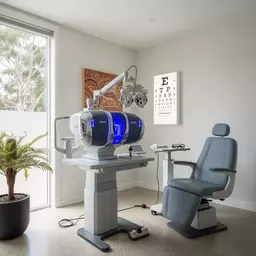Understanding Laser Eye Surgery Costs

Considering laser eye surgery? It's not just about achieving clear vision; understanding the financial implications is crucial. As costs can vary widely, educating yourself on the factors influencing price can empower your decision-making journey.
What You Will Learn
- Different types of laser eye surgery available in Australia, including LASIK, PRK, and SMILE, each with unique benefits.
- Average price ranges for these procedures, helping you budget for your eye care effectively.
- Factors influencing the costs, such as technology used, surgeon experience, and geographic location.
- Financial considerations, including insurance coverage, payment plans, and consultation fees that can impact your overall expenses.
- Tips for estimating your personalized surgery costs and what to expect during your initial consultation.
- Real patient experiences that highlight the long-term benefits and potential risks of laser eye surgery.
Laser Eye Surgery Costs in Australia: Procedure Comparison & Long-Term Value
Understanding the financial aspects of laser eye surgery involves comparing different procedures and evaluating the long-term benefits against initial costs.
Average Procedure Costs (AUD per eye)
Long-term Value: Glasses/Contacts vs. Laser Surgery
- ✓ Glasses/Contacts: Annual costs add up
- ✓ Laser Surgery: One-time investment, long-term benefits
- ✓ Improved quality of life without corrective lenses
Key Factors Influencing Costs
- • Technology Used: Advanced systems ↑ costs
- • Surgeon Experience: Highly qualified ↑ fees
- • Geographic Location: Urban centers often ↑ prices
- • Accreditation: High standards ↑ investment
Risks & Complications to Consider
- × Dry Eyes: Common post-surgery, manageable with drops.
- × Visual Disturbances: Halos or glare, especially at night.
- × Undercorrection/Overcorrection: May require adjustments.
A Comprehensive Overview of Laser Eye Surgery Costs in Australia
Understanding the costs associated with laser eye surgery is crucial for anyone considering this transformative procedure. At VisionCost Insights, we aim to clarify all aspects surrounding laser eye surgery costs in Australia, empowering you to make informed decisions about your vision correction journey.
In this section, we'll explore the various types of laser eye surgery available, break down the costs involved, and discuss the factors that influence pricing. Let’s dive in!
Understanding Laser Eye Surgery: What You Need to Know
Laser eye surgery is a revolutionary procedure designed to correct vision problems such as nearsightedness, farsightedness, and astigmatism. It uses advanced laser technology to reshape the cornea, improving the way light enters the eye and allowing for clearer vision.
At its core, the purpose of laser eye surgery is to reduce dependency on glasses and contact lenses, giving patients the freedom to enjoy life without the hassle of corrective eyewear!
Defining Laser Eye Surgery and Its Purpose
Essentially, laser eye surgery is about enhancing your eyesight through surgical intervention. By reshaping the cornea, we can effectively correct refractive errors, providing clarity and comfort in daily activities.
This procedure can significantly improve your quality of life, whether you're an athlete needing clear vision or someone tired of dealing with contact lenses. Understanding this can help you feel more confident as you explore your options!
Common Types of Laser Eye Surgery Available in Australia
- LASIK (Laser-Assisted In Situ Keratomileusis)
- PRK (Photorefractive Keratectomy)
- SMILE (Small Incision Lenticule Extraction)
- Conductive Keratoplasty (CK)
These procedures vary in technique and benefits, so it's essential to discuss them with your ophthalmologist to find the best fit for your needs. Each option has its unique advantages, and we’re here to help you navigate them!
Exploring Treatment Options: LASIK, PRK, and Beyond
Among the most popular options, LASIK stands out for its quick recovery and minimal discomfort. On the other hand, PRK may be suitable for patients with thinner corneas. SMILE is an innovative technique that's gaining traction, offering a less invasive option with promising results.
Ultimately, the choice of procedure depends on your specific vision needs, eye health, and lifestyle preferences. I encourage you to consider these factors when making your decision!
Breaking Down the Costs of Laser Eye Surgery
When it comes to the costs associated with laser eye surgery, understanding the average price ranges can be quite enlightening. This knowledge allows you to plan effectively for your vision correction journey.
Let’s break down what you can generally expect to pay.
Average Price Ranges for LASIK, PRK, and SMILE in Australia
- LASIK: Between $2,000 to $3,500 per eye. According to NVISION Eye Centers, the average cost of LASIK can be around $2,500 per eye, which aligns with Australian pricing.
- PRK: Approximately $2,000 to $3,000 per eye
- SMILE: Ranges from $2,500 to $4,000 per eye
These figures can vary based on multiple factors, including the technology used and the specific clinic. It’s important to consult with your eye care provider for precise pricing details!
Comparative Costs: How Procedure Choices Affect Pricing
The choice of procedure can greatly impact your overall costs. For instance, SMILE, as a newer technique, may come at a premium due to the advanced technology involved.
Additionally, while LASIK tends to be the most common and often the most affordable, your personal preferences and ocular health should guide your decision.
Cost Comparison: Understanding Geographic Variability in Pricing
Location plays a significant role in the costs associated with laser eye surgery. Urban centers like Sydney or Melbourne often have higher prices compared to regional areas. This variability reflects the differences in overhead costs and demand for services.
Being aware of geographic influences can help you seek out options that fit your budget while still providing high-quality care!
Factors Influencing Laser Eye Surgery Costs
Numerous factors can influence the overall costs of laser eye surgery. By understanding these elements, you can better prepare for your financial commitment.
Let's explore some of the most significant factors!
The Role of Technology in Pricing
- Advanced laser systems may increase costs
- Precision technology can enhance outcomes
- Older techniques may be less expensive but offer varied results
Investing in the latest technology often correlates with better outcomes and reduced recovery times, so consider this when evaluating your options!
Surgeon Experience and Qualifications: Do They Matter?
The experience and qualifications of your surgeon can significantly influence the costs. Highly experienced surgeons may charge more for their expertise, but they often offer enhanced safety and efficacy.
Choosing a qualified surgeon can make a big difference in your overall experience and results—prioritize their credentials during your decision-making process!
Geographic Considerations: How Location Impacts Costs
Your location can affect not only the pricing but also the availability of specific procedures. Larger cities might have more options but also higher costs.
Consider exploring clinics in various locations to find a balance between cost and quality!
Accreditation Standards and Their Impact on Surgery Costs
Surgeons and clinics that maintain high accreditation standards often invest more in their equipment and training, which can drive up costs. However, this can also assure you of receiving quality care.
Look for clinics that uphold strict accreditation to ensure you're making a safe and wise investment in your eye health!
Financial Considerations for Laser Eye Surgery
Financial planning is essential when considering laser eye surgery. Knowing what to expect regarding coverage and payment options can help you budget effectively.
Let's discuss these important financial aspects!
Insurance Coverage: What You Should Know About Medicare and Private Health Insurance
- Medicare may cover certain aspects of eye care
- Private health insurance options vary widely
- Check with your provider to understand your benefits
It’s crucial to clarify your coverage to avoid surprises when it comes time to pay. I recommend reaching out to your insurance provider to gather all necessary information!
Payment Plans and Financing Options for Surgery
Many clinics offer payment plans that can help spread the cost over time. Financing options may also be available through third-party providers, allowing you to manage costs more effectively.
Exploring these options can alleviate some financial pressure and make surgery more accessible!
Understanding Consultation Fees and Their Role in Overall Costs
Consultation fees can vary among clinics, and understanding these costs is essential. Some clinics may waive the fee if you proceed with the surgery, while others require payment upfront.
Be sure to clarify these details during your initial appointment so that you can budget accordingly!
How to Estimate Your Personalized Laser Eye Surgery Costs
Estimating your personalized costs for laser eye surgery can help you prepare financially. There are several factors you'll need to consider.
Let’s explore how you can get a better understanding of what to expect!
Utilizing Cost Calculators for Tailored Estimates
Many clinics offer online cost calculators that can provide personalized estimates based on your specific needs. These tools can be a great starting point for understanding your potential expenses.
Utilizing these resources can give you a clearer picture before you even step into the office!
Factors to Consider When Estimating Your Surgery Costs
- Type of procedure chosen
- Surgeon's experience and qualifications
- Location of the clinic
- Technology used in the procedure
By considering these factors, you can create a more accurate estimate that aligns with your financial situation and vision goals!
Essential Pre-operative Assessments for Accurate Cost Estimation
Pre-operative assessments are vital for determining the exact costs associated with your surgery. These evaluations can identify any additional treatments or requirements that may affect pricing.
Don’t hesitate to ask about any assessments needed before your surgery—this helps ensure there are no unexpected costs later on!
Real Experiences: Case Studies of Patients Who Underwent Surgery
Hearing from others who have undergone laser eye surgery can provide valuable insights into the financial and personal aspects of the experience.
In this section, we’ll share some stories that illustrate the journey of laser eye surgery patients!
Patient Stories: Financial and Outcome Perspectives
Many patients find that the financial investment in laser eye surgery pays off in the long run, both in terms of convenience and quality of life improvements. These stories can inspire and inform your decision-making process!
Consider discussing these experiences with your eye care professional to gain additional insights!
Long-term Cost Comparison: Glasses/Contacts vs. Laser Surgery
- Annual costs for glasses and contacts can add up significantly
- Laser surgery is a one-time investment with long-term benefits
- Patients often experience improved quality of life without the hassles of corrective lenses
Understanding this comparison can help you see the broader value of laser eye surgery beyond just the initial expense!
Patient Testimonials: Insights into Recovery and Satisfaction
Many patients report high satisfaction levels following their surgeries, often highlighting the quick recovery and immediate improvement in vision. These testimonials can provide reassurance as you contemplate your options!
Hearing firsthand accounts can make the journey feel more relatable and achievable.
FAQs About Laser Eye Surgery Costs in Australia
- Q1: What are the average costs for LASIK, PRK, and SMILE in Australia?
- A1: LASIK generally costs between $2,000 to $3,500 per eye, PRK is approximately $2,000 to $3,000 per eye, and SMILE ranges from $2,500 to $4,000 per eye. These are average figures and can vary.
- Q2: Does insurance cover laser eye surgery in Australia?
- A2: Medicare typically does not cover elective laser eye surgery. Private health insurance coverage varies widely; it's essential to check with your specific provider regarding your benefits and any potential rebates.
- Q3: What factors influence the cost of laser eye surgery?
- A3: Key factors include the type of procedure, the technology used, the surgeon's experience and qualifications, the geographic location of the clinic, and its accreditation standards.
- Q4: Is laser eye surgery a worthwhile investment in the long term?
- A4: For many, yes. While the upfront cost can be significant, the long-term savings on glasses, contact lenses, and related accessories, coupled with improved quality of life and convenience, often make it a worthwhile investment.
- Q5: What are the potential risks and complications of laser eye surgery?
- A5: Common risks include dry eyes, visual disturbances like halos or glare (especially at night), and in rare cases, undercorrection or overcorrection, which may require further adjustment.
Choosing the Right Surgeon for Your Laser Eye Surgery
Finding the right surgeon is one of the most important steps you can take in your laser eye surgery journey. The right match will ensure a smooth experience and optimal results.
Let's discuss what to look for!
What to Look for in a Qualified Surgeon
- Experience and training in laser eye procedures
- Positive patient reviews and testimonials
- Accreditation and recognition in the field
Prioritizing these qualities will help you find a surgeon who aligns with your needs and aspirations for clearer vision!
Accreditation and Credentials: Importance of RANZCO
Choosing a surgeon accredited by organizations like RANZCO (Royal Australian and New Zealand College of Ophthalmologists) can assure you of their professional standards and commitment to patient safety.
This accreditation signifies that they have met rigorous training and quality benchmarks—an essential consideration in your decision-making!
How to Research and Evaluate Eye Care Professionals
Conducting thorough research is key to finding the best eye care professional for your needs. Look into their credentials, read reviews, and ask for recommendations from trusted sources.
Engaging in this process will enable you to feel confident about your choice as you prepare for laser eye surgery!
Interactive Poll: Your Thoughts Matter!
As you consider the financial aspects of laser eye surgery, we'd love to hear your perspective! What factor influences your decision the most when contemplating this procedure?
Summarizing the Financial Aspects of Laser Eye Surgery in Australia
As we wrap up our exploration of laser eye surgery costs in Australia, it’s essential to consider not just the financial commitment but also the overall value of this vision correction journey. Is laser eye surgery worth the investment? This question often pops up and deserves a thoughtful answer!
While the upfront costs can seem daunting, the long-term benefits typically outweigh these initial expenses. In the next few paragraphs, we'll delve into evaluating these benefits and understanding the associated risks.
Is Laser Eye Surgery Worth the Investment?
When assessing whether laser eye surgery is a wise investment, one must look beyond the immediate costs. Evaluating the long-term benefits can provide a clearer picture. For many patients, the freedom from glasses and contacts translates to both financial savings and lifestyle improvements.
- Reduced ongoing costs: After surgery, you may save on prescription glasses, contact lenses, and related accessories.
- Improved quality of life: Enjoy activities like swimming, traveling, or exercising without the hassle of vision correction devices.
- Time savings: Say goodbye to daily routines of putting on contacts or cleaning glasses!
However, it’s also crucial to acknowledge the potential risks and complications associated with surgery. While rare, issues like dry eyes, glare, or fluctuations in vision can occur. Understanding these factors can help you weigh the benefits against the risks effectively.
Evaluating the Long-term Benefits Beyond Immediate Costs
It's not just about the money—consider the long-term lifestyle changes that laser eye surgery can bring. Imagine waking up each day with clear vision without fumbling for your glasses! This newfound clarity can open up a world of possibilities, from personal pursuits to professional opportunities.
- Enhanced productivity: Clear vision helps you stay focused and engaged at work or during hobbies.
- Increased confidence: Enjoy a more confident and liberated lifestyle without the burden of corrective lenses.
- Healthier eyes: Reducing dependency on contacts can lead to fewer eye infections and irritations.
While the costs can be a significant factor, aligning them with these lasting benefits often leads to a favorable outlook on your decision.
Understanding Risks and Complications Associated with Surgery
As with any medical procedure, it’s vital to approach laser eye surgery with a full understanding of the possible risks. Familiarize yourself with potential complications so you can make an informed decision about your eye health.
Even though organizations like the FTC have taken action against misleading advertising related to LASIK, it remains crucial for patients to be fully informed about all potential outcomes.
- Dry eyes: Many patients experience dry eye symptoms post-surgery, which can be managed with lubricating drops.
- Visual disturbances: Some individuals might notice halos or glare, particularly at night.
- Under or overcorrection: In some cases, the desired vision correction may not be achieved initially, possibly requiring further adjustments.
Discussing these risks with your surgeon can pave the way for a clearer expectation and help you feel more at ease as you consider your options.
Taking the Next Steps Toward Clear Vision
Ready to take the plunge? Before your initial consultation, there are a few tips that can help you maximize your visit! Preparing can ease any anxiety and ensure you get the most out of your appointment.
Consultation Tips: Preparing for Your Initial Appointment
Your first step in this journey should involve a comprehensive consultation. Here are some tips to help you prepare:
- Write down your questions: Prepare a list of questions you want to ask your surgeon, especially regarding costs and financing options.
- Gather your medical history: Be ready to discuss any previous eye conditions or surgeries.
- Bring a list of medications: Inform your surgeon about any medications or supplements you take regularly.
This preparation will ensure you leave the consultation with a better understanding of your options and a clearer idea of what to expect financially.
Final Thoughts: Making an Informed Decision About Laser Eye Surgery
Ultimately, making an informed decision about laser eye surgery comes down to understanding both the costs and the benefits. It’s essential to weigh the financial aspects alongside the potential improvements to your quality of life. At VisionCost Insights, we aim to empower you with information, ensuring you feel confident in your choices!
Educational Resources for Further Information on Vision Correction
To help you on your journey, consider exploring the following resources:
- Visit the RANZCO website for information on surgeon accreditation and standards.
- Check out patient forums for real experiences and insights from others who have undergone surgery.
- Utilize online calculators to estimate potential costs based on your unique circumstances.
With these tools at your disposal, you’ll be well-equipped to navigate your laser eye surgery options effectively!
Recap of Key Points
Here is a quick recap of the important points discussed in the article:
- Laser eye surgery options include LASIK, PRK, and SMILE, each varying in technique and cost.
- Average costs for these procedures in Australia range from $2,000 to $4,000 per eye, influenced by factors such as technology and location.
- Insurance coverage varies; it's essential to check with providers regarding benefits for eye surgery.
- Surgeon experience and clinic accreditation significantly affect overall costs and quality of care.
- Preparing for your consultation by writing questions and gathering medical history can enhance your experience and decision-making.








